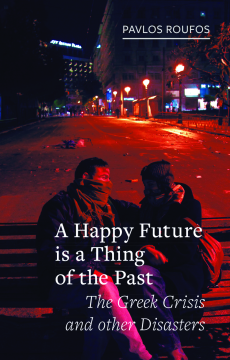
Additional Information
Book Details
Abstract
Since 2010, Greece’s social and economic conditions have been irreversibly transformed due to austerity measures imposed by the European troika and successive Greek governments. These stringent restructuring programs were intended to make it possible for Greece to avoid default and improve its debt position, and to reconfigure its economy to escape forever the burden of past structural deficiencies. But things have not gone according to plan. Eight years later, none of these targets have been met. If the programs were doomed to fail from the start, as many claim, what were the real objectives of such devastating austerity?
In this latest installment in Reaktion's Field Notes series, published in association with the Brooklyn Rail, Pavlos Roufos answers this key question in an insightful, critical analysis of the origins and management of the 2010 Greek economic crisis. Setting the crisis in its historical context, Roufos explores the creation of the Eurozone, its “glorious” years, and today’s political threats to its existence. By interweaving stories of individual people’s lived experiences and describing in detail the politicians, policies, personalities, and events at the heart of the collapse, he situates its development both in terms of the particularities of the Greek economy and society and the overall architecture of Europe’s monetary union. This broad examination also illuminates the social movements that emerged in Greece in response to the crisis, unpacking what both the crisis managers and many of their critics presented as a given: that a happy future is a thing of the past.
“A careful and penetrating analysis of the cruel torment of Greece, and its background in the emerging global political economy, as the regimented capitalism of the early postwar period, with gains for much of the population, has been subjected to the assault of neoliberal globalization, with grim effects and threatening consequences.”
— Noam Chomsky
“This is an ambitious book, setting the scene for the calamity in Greece in the development of the European Union and the evolution of the broader crisis in the world economy. Its analysis of Syriza's response to the Greek crisis illustrates a key lesson: those who want to fight against austerity policies cannot rely upon a political party that wants to rescue capitalism.”
— Tony Norfield, author of "The City: London and the Global Power of Finance"
"Like no other book, A Happy Future is a Thing of the Past narrates the crisis from the heights of yield curves and debtloads to the street level of tear gas and self-help. Roufos's story is enlightening, harrowing, and, unfortunately, essential."
— Quinn Slobodian, author of "Globalists: The End of Empire and the Birth of Neoliberalism"
“This new book by the Greek activist Roufos is not about the European crisis and Greece, but about the Greek Crisis. It provides a glimpse into the political life of the Greek masses—not as helpless victims but as political actors—and what occurred in front of the doors of parliament and government buildings. . . . Roufos ticks all the important boxes in his political and economic analysis. What is unique is that this is merely a background for his account of what was happening in Greek politics and in the streets of Greek cities, especially Athens. . . . Very astute.”
— Mathew D. Rose, Brave New Europe
"Seldom do Marxian analyses weave together politics and economics as seamlessly as Roufos in A Happy Future Is a Thing of the Past. . . . Roufos’s command of the economic data is virtuosic. Making the dismal science . . . exciting to nonspecialists is no small task, but he works figures and statistics into his narrative without skipping a beat . . . [and] asks the right questions about what befell Greece since 2010. One need look no further for a comprehensive guide to the catastrophe of the present."
— Marx and Philosophy
"This tract is worth reading and digesting because the Greek lesson must be learnt."
— Socialist Standard
Pavlos Roufos has been active in Greece’s social movements since the 1990s and has written on Greece and the economic crisis for the Brooklyn Rail and Jungle World. He has worked as a film editor and is currently a researcher on German economic policy at the University of Kassel.
Table of Contents
| Section Title | Page | Action | Price |
|---|---|---|---|
| Cover | Cover | ||
| Title Page | 3 | ||
| Imprint Page | 4 | ||
| Contents | 5 | ||
| Introduction | 7 | ||
| One: A Thing of the Past | 11 | ||
| Two: The Monetarist Transformation | 24 | ||
| Three: A Green Sun | 41 | ||
| Four: ‘Holy Cow!’ | 66 | ||
| Five: The ‘Greek’ Crisis | 77 | ||
| Six: Years of Stone | 86 | ||
| Seven: After the End | 122 | ||
| Epilogue: The Future is Not What It Used to Be | 158 | ||
| References | 169 | ||
| Acknowledgements | 213 | ||
| Index | 215 |
